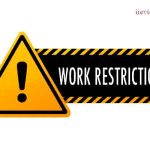What If an Employer Cannot Accommodate Work Restrictions?

Are you worried about what will happen if your employer can’t accommodate your work restrictions? You’re not alone, my friend. Having work restrictions can be super stressful, especially if you’re not sure what your employer is going to do. In this article, we’ll break down what happens if an employer cannot accommodate work restrictions and what you can do about it.
Understanding Work Restrictions
Before we dive in, let’s talk about what work restrictions are. Work restrictions are limitations or modifications that an employer makes to an employee’s job duties or work environment to help them perform their job safely and effectively. These restrictions can be temporary or permanent and are usually implemented after an employee has been injured or has a medical condition that affects their ability to do their job.
What If an Employer Cannot Accommodate Work Restrictions?
So, what if an employer cannot accommodate work restrictions? This is a common question that many employees have, especially if they’re dealing with a permanent disability or chronic illness. If an employer is unable to accommodate an employee’s work restrictions, it can be a real challenge for both the employee and the employer.
Why Can’t Employers Accommodate Work Restrictions?
There are many reasons why an employer may not be able to accommodate work restrictions. Some common reasons include:
- Business necessity: The employer may need to prioritize business operations over accommodating an employee’s work restrictions.
- Undue hardship: Accommodating work restrictions may cause significant financial or operational difficulties for the employer.
- Lack of resources: The employer may not have the necessary resources or equipment to accommodate an employee’s work restrictions.
What Happens If an Employer Cannot Accommodate Work Restrictions?
If an employer is unable to accommodate an employee’s work restrictions, there are several things that can happen. Here are a few possible scenarios:
- Transfer to a different position: The employer may be able to transfer the employee to a different position within the company that can accommodate their work restrictions.
- Leave of absence: The employer may offer the employee a leave of absence, which can be paid or unpaid, depending on the company’s policies and the employee’s eligibility for leave.
- Separation from employment: In some cases, the employer may not be able to accommodate an employee’s work restrictions, and the employee may be separated from employment. This can be a difficult and stressful experience for the employee.
What Can You Do If an Employer Cannot Accommodate Work Restrictions?
If you’re in a situation where your employer cannot accommodate your work restrictions, there are several things you can do. Here are a few suggestions:
- Communicate with your employer: It’s essential to communicate openly and honestly with your employer about your work restrictions and any challenges you’re facing.
- Explore alternative options: Work with your employer to explore alternative options, such as a transfer to a different position or a leave of absence.
- Seek support from HR: If you’re not getting the support you need from your supervisor or manager, it’s a good idea to reach out to HR for guidance and assistance.
What Are Your Rights as an Employee?
As an employee, you have rights under the Americans with Disabilities Act (ADA) and other federal and state laws. These laws require employers to provide reasonable accommodations for employees with disabilities or medical conditions.
- ADA protections: The ADA prohibits discrimination against employees with disabilities and requires employers to provide reasonable accommodations.
- FMLA protections: The Family and Medical Leave Act (FMLA) provides eligible employees with up to 12 weeks of unpaid leave for certain family and medical reasons.
What If an Employer Cannot Accommodate Work Restrictions?
What About Insurance and Benefits?
If you’re unable to work due to a medical condition or disability, you may be eligible for insurance and benefits. Here are a few things to keep in mind:
- Disability insurance: If you have disability insurance, you may be eligible for benefits if you’re unable to work due to a medical condition or disability.
- Workers’ compensation: If you were injured on the job, you may be eligible for workers’ compensation benefits.
What If an Employer Cannot Accommodate Work Restrictions?
Can You File a Lawsuit?
If you believe that your employer has failed to accommodate your work restrictions or has discriminated against you due to a medical condition or disability, you may be able to file a lawsuit.
- ADA claims: You can file a claim with the Equal Employment Opportunity Commission (EEOC) if you believe that your employer has violated the ADA.
- State law claims: You may also be able to file a claim under state law, depending on the laws in your state.
Conclusion: What If an Employer Cannot Accommodate Work Restrictions?
If your employer cannot accommodate your work restrictions, it can be a challenging and stressful experience. However, there are things you can do to protect your rights and explore alternative options. By communicating openly with your employer, seeking support from HR, and exploring alternative options, you can work together to find a solution that works for everyone. Remember, you have rights as an employee, and there are laws in place to protect you. Don’t be afraid to advocate for yourself and seek help if you need it. What if an employer cannot accommodate work restrictions? Now you know what to do.
<